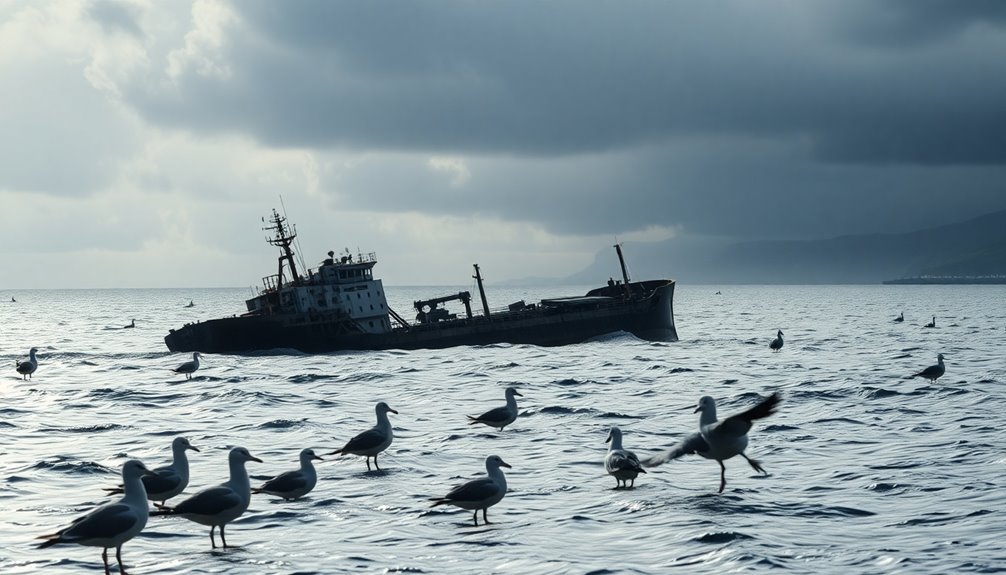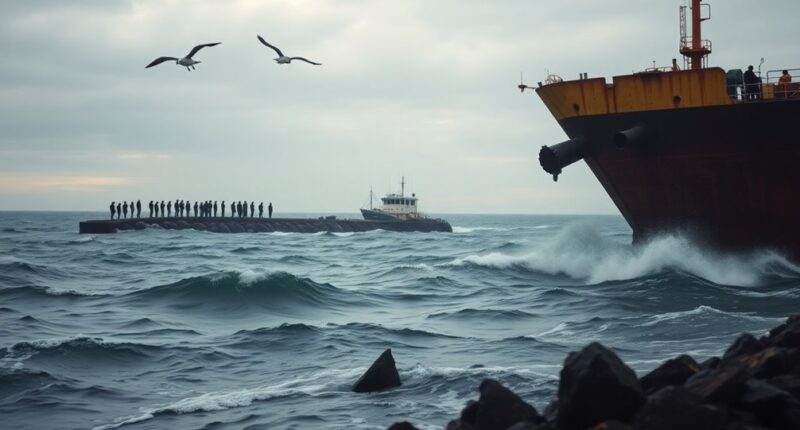The recent collision between the Stena Immaculate and Solong raises urgent questions of blame. With the captain of Solong arrested for gross negligence manslaughter, issues of regulatory oversight come to light, especially considering the ship's failed safety checks. As massive fuel leaks threaten the North Sea's ecosystem, the spotlight's on who'll be held responsible for this disaster. Stay tuned, as more details unfold about the legal and environmental ramifications of this tragic event.
Key Takeaways
- The captain of the Solong has been arrested for gross negligence manslaughter, indicating legal accountability for the crash.
- Solong's previous safety failures raise questions about regulatory oversight and maintenance compliance prior to the incident.
- Environmental assessments are ongoing, and potential cleanup costs may fall on the UK government due to the fuel leak.
- Investigations are focusing on the chain of responsibility, examining both crew actions and vessel maintenance leading to the collision.
- Public and governmental scrutiny is increasing, with millions concerned about the implications for maritime safety regulations and environmental protection.

As the investigation into the North Sea tanker crash unfolds, questions about accountability and safety standards are mounting. You can't ignore the scale of the disaster that occurred off East Yorkshire's coast when the U.S.-flagged oil tanker Stena Immaculate collided with the Portuguese-flagged cargo ship Solong.
The aftermath left one crew member from the Solong missing and presumed dead, while a massive fireball erupted, causing chaos and multiple explosions on the Stena Immaculate due to a ruptured fuel tank. While 36 crew members were rescued, it's hard to overlook the casualties and the potential for ecological disaster.
One crew member is missing and presumed dead, while chaos ensued with explosions and a potential ecological disaster.
The Stena Immaculate carried 35 million liters of U.S. military jet fuel, which leaked into the North Sea during the collision. Although the Solong's containers, previously containing sodium cyanide, remained intact, the jet fuel spill raises significant environmental concerns. You might wonder how this incident could happen, especially when the Solong had already failed safety checks just months before.
The investigation is scrutinizing the Solong's safety record, which revealed several deficiencies, including inadequate alarms and poorly maintained survival craft. Despite these issues, the vessel wasn't detained, raising further questions about regulatory oversight. The captain of the Solong, a 59-year-old Russian national, has been arrested on suspicion of gross negligence manslaughter, highlighting the legal implications of this tragic event. As environmental assessments proceed, the Maritime and Coastguard Agency is considering necessary counter-pollution measures, while the UK government might face significant cleanup costs.
In addition, the rescue operation was extensive, involving lifeboats and helicopters over a 12-hour period to ensure the safety of the crew members. With safety tugs positioned near the affected vessels and a large-scale rescue operation successfully executed, you can see the immediate response to this crisis. However, the lingering question remains: who'll ultimately bear the blame for this catastrophic incident, and what steps will be taken to prevent future tragedies?
Frequently Asked Questions
What Immediate Actions Are Being Taken for Environmental Cleanup?
You'll see immediate actions focused on cleaning up plastic pellets, or nurdles, from the affected areas.
Cleanup teams are mapping out patches and deploying vessels to net the pollutants from the sea. All-terrain vehicles and specialized equipment are clearing nurdles from beaches before high spring tides.
Authorities are coordinating efforts across regions to protect wildlife, especially birds that might mistake these pellets for food, making swift action crucial.
How Are Local Communities Affected by the Crash?
Local communities feel the impact of the crash deeply.
You see concerns rising about the health of marine life and the future of local fisheries. Many depend on the Holderness area for their livelihoods, and the potential pollution threatens their way of life.
Residents are actively monitoring the situation, advocating for stronger regulations, and pushing for a transition to cleaner energy sources, all while hoping to safeguard their environment and economic stability.
What Are the Long-Term Impacts on Marine Life?
You might think marine life will quickly bounce back after an incident, but the long-term impacts can be severe.
Oil spills and pollutants disrupt ecosystems, affecting everything from plankton to dolphins. You'll see declines in fish populations, which could lead to food shortages for larger predators.
Additionally, toxins can linger, causing chronic health issues in marine organisms. Without stringent regulatory measures and cleanup, these effects could ripple through the food chain for years.
Will There Be Compensation for Affected Fishermen?
You might be wondering if there'll be compensation for affected fishermen.
Yes, they can file insurance claims or seek compensation from responsible parties. National and international maritime regulations will guide this process, assessing liability based on ongoing investigations.
The government may also step in with emergency funds or subsidies to support those impacted.
Keep an eye on developments, as the extent of compensation will depend on the findings of these investigations.
How Is the Shipping Industry Responding to This Incident?
The shipping industry's response to the incident is proactive.
You're seeing emergency response teams activated immediately, and multiple agencies are collaborating to ensure safety and environmental protection.
Investigations are underway to determine what went wrong, pushing for stricter safety measures and enhanced protocols.
You can expect regulatory changes aimed at preventing future accidents and improved training for crew members to handle emergencies effectively.
The focus is on safety, environment, and accountability.
Conclusion
As the world watches the aftermath of the North Sea tanker crash, the search for accountability feels like a modern-day trial of Hercules, where the weight of responsibility hangs heavy. You can't help but wonder who'll bear the brunt of this catastrophe. With millions impacted, the stakes couldn't be higher. Just like the fabled tales of old, the true story of blame will unfold, revealing heroes and scapegoats amid the waves of uncertainty.









